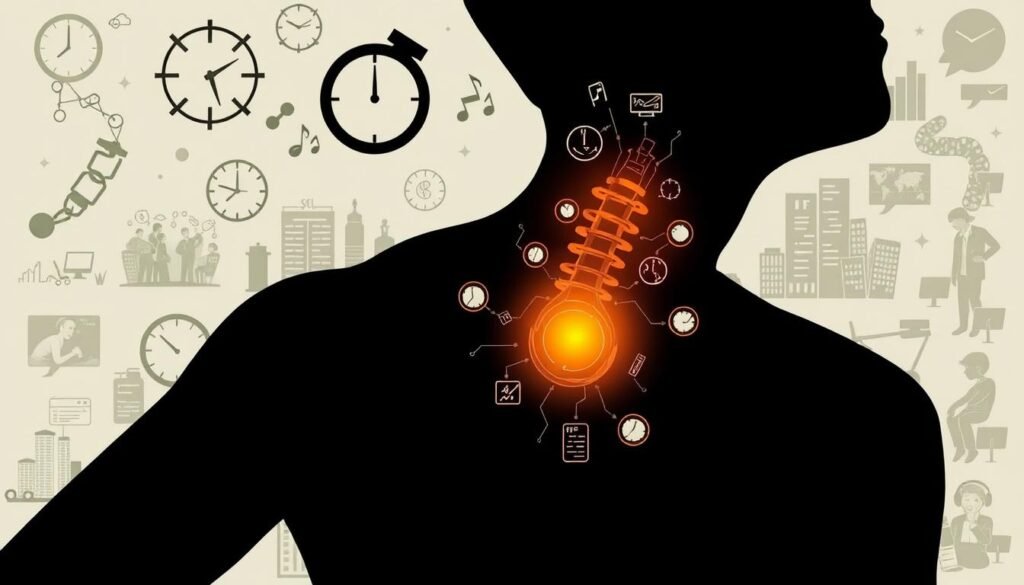Research shows that people with anxiety are much more likely to experience neck pain. This reveals a strong mind-body connection. Psychological stress often reflects as physical pain, particularly in the neck. This connection points to the need for treatment that looks at both mind and body. Studies from places like the Rhematology Department at El Ayachi Hospital have shown how anxiety affects muscle tension. This shows a clear connection between stress and neck pain. Realizing the causes of anxiety neck pain is key to treating it effectively. It involves addressing both the mental and physical issues.
Key Takeaways
- Individuals with anxiety disorders report a higher incidence of chronic neck pain.
- The connection between anxiety and muscle tension is well-documented.
- Cognitive-behavioral therapy is effective in addressing both anxiety and neck pain.
- Stress-related factors contribute significantly to neck discomfort.
- Managing stress can improve symptoms of anxiety neck pain.
- Support groups and community resources play a vital role in coping with anxiety and pain.
The Connection Between Anxiety and Physical Symptoms
Anxiety and physical symptoms are closely linked, often causing discomfort. Anxiety leads to physical complaints, largely through psychosomatic disorders. These show how our feelings can create real physical reactions. For example, neck pain is a common issue, showing anxiety’s impact on our health.
Understanding Psychosomatic Disorders
Psychosomatic disorders show a strong connection between our minds and bodies, with stress turning into physical pain. Studies show anxiety can increase the risk of chronic pain, like neck pain. This highlights the importance of treating not just the body, but also the mind.
The Interaction Between Mind and Body
The mind and body are deeply connected, with psychological stress affecting our physical condition. Anxiety can cause muscle tension, leading to discomfort in the neck and shoulders. This tension makes stress worse, trapping us in a hard-to-break cycle. It’s important to understand this link for effective treatment plans.
How Anxiety Induces Muscle Tension
Anxiety often shows up as a physical issue, leading to muscle tension. When feeling anxious, your body releases stress hormones. This causes your muscles to tighten, especially around the neck and shoulders. It affects both how you feel inside and can cause physical discomfort.
The Role of Stress Hormones
Stress hormones, like cortisol, are key in creating muscle tension during anxiety. This makes your body more alert. The muscles might contract without you wanting them to. This is why your neck and shoulders often feel tight.
Effects on the Neck and Shoulder Muscles
Long-term anxiety leads to neck and shoulder pain due to tight muscles. The tightness can spread, affecting the jaw and chest too. This ongoing tension not only hurts but can make anxiety worse. It traps you in a cycle that’s hard to break. To help manage it, try relaxation techniques. For tips on easing tension, check out this link.
Anxiety Neck Pain: The Vicious Cycle
Anxiety and neck pain are linked in a vicious cycle of pain. They can lead to a lot of discomfort and stress. When stressed, your body tightens up. The neck and shoulders get most of this tension. This can make the pain worse and hard to stop.
The Interrelation of Stress and Neck Pain
Stress can make your neck and upper back muscles stay tight. This makes the pain worse and leads to more anxiety. Studies show that people with back pain often have anxiety too. This is true for conditions like fibromyalgia and arthritis, where anxiety comes with the physical pain.
Chronic Pain and Psychological Impact
The psychological impact of chronic pain is big. Anxiety doesn’t just feel bad. It can make muscles tight and cause migraines. Stress and pain together can trap you in more emotional trouble. But breathing exercises and stretching can help. They aim to break this vicious cycle of pain.

| Condition | Common Psychological Disorders |
|---|---|
| Back Pain | Anxiety Disorders |
| Fibromyalgia | Hypersensitivity to Pain |
| Arthritis | Anxiety and Depression |
| Migraine Headaches | Anxiety Disorders |
Risk Factors Associated with Anxiety Neck Pain
Understanding the risk factors for anxiety neck pain is key to managing it well. Studies show that gender differences play a big role. Women often have more anxiety and neck pain than men. This fact highlights the need for gender-specific treatment methods. The connection between the mind and neck pain shows how anxiety can make pain worse.
Gender Differences in Prevalence
More women suffer from anxiety neck pain than men. In 2017, 166 million women versus 122.7 million men faced neck pain. This gender difference is clear in how often it happens and how severe it gets. Studies link depression and anxiety to more neck pain. This shows treating mental health is crucial.
Impact of Physical Activity
Being active affects the risk of getting anxiety neck pain. People who barely exercise tend to develop more neck pain. The physical activity impact is big on both physical and mental health. This suggests that being active can help ease neck pain symptoms. Studies support that low exercise levels can increase pain and anxiety.

To learn more about anxiety and neck pain, check out this research article.
Recognizing the Symptoms of Anxiety-Induced Neck Pain
Understanding anxiety neck pain is key. It’s a condition that many people face but often ignore. This kind of pain can really affect how you live each day. It’s so important to know the signs so you can get the right help and care.
Common Physical Manifestations
People with anxiety neck pain report a few common symptoms. These include:
- Tension and stiffness in the neck
- Reduced range of motion, leading to discomfort
- Headaches that may accompany neck discomfort
- Muscle tightness that can extend to the shoulders
Emotional stress can make neck pain worse. Anxiety and physical symptoms mix together, leading to chronic neck pain. This kind of pain can last for months.
Psychological Signs to Look For
Psychological signs often occur with this neck pain. Spotting these early can help. Often seen psychological signs are:
- Irritability and mood swings
- Feelings of fatigue or low energy
- A sense of being overwhelmed or anxious
Realizing that mind and body are connected helps us see the full picture. If you have chronic neck pain, knowing this can stress the need to care for both your physical and emotional health.

Understanding the Role of Relaxation Exercises
Relaxation exercises are key in reducing anxiety and easing neck pain. They help manage the stress of daily life and health issues. Techniques like deep breathing, stretching, and muscle relaxation are especially good.
Effective Techniques for Muscle Relaxation
Many muscle relaxation methods fit easily into your day-to-day life. These include:
- Deep Breathing. Slow breathing tells your brain you’re safe, which lowers anxiety.
- Progressive Muscle Relaxation. By tensing and relaxing muscles, you become more in tune with your body.
- Yoga and Tai Chi. These activities combine mental and physical exercise, helping reduce muscle stress.
The Benefits of Progressive Muscle Relaxation
Progressive muscle relaxation offers many advantages, such as:
- It eases muscle tightness in the neck and shoulders.
- It helps improve focus and stabilizes mood, affecting daily life positively.
- It makes sleep better, aiding in health and recovery.
Understanding relaxation exercises helps control anxiety’s physical effects, like muscle tightness and headaches. Making these exercises a habit can greatly enhance well-being. For more on managing anxiety symptoms, see how anxiety and headaches are linked. Visit this site for stress management tips.
Stress Management Strategies for Neck Pain Relief
Managing stress is key to easing neck pain. Techniques to reduce stress can also decrease muscle tension. Knowing different stress management strategies helps tackle neck pain fully.
Mindfulness Techniques to Alleviate Anxiety
Mindfulness, like meditation and yoga, greatly lowers anxiety. These activities increase awareness and help spot tension areas. By regularly doing these techniques, people can lessen muscle tightness, especially in the neck.
- Mindful breathing exercises can relax the neck and shoulders.
- Yoga poses specifically designed for neck relief can improve flexibility and range of motion.
- Regular meditation sessions promote mental clarity, reducing stress levels significantly.
Trigger Point Therapy and its Benefits
Trigger point therapy targets tight knots in muscles. It is recognized for its effectiveness in easing neck pain. Treating these trigger points helps decrease stress-related neck discomfort.
| Technique | Benefits |
|---|---|
| Mindfulness Practices | Reduces anxiety, promotes relaxation, enhances awareness |
| Yoga | Improves flexibility, strengthens neck muscles, alleviates tension |
| Trigger Point Therapy | Targets specific pain areas, provides immediate relief, reduces muscle tension |
| Massage Therapy | Relieves stiff muscles, promotes relaxation, alleviates headache symptoms |
Using these stress management techniques daily can really help with neck pain. Combining mindfulness with trigger point therapy creates an effective stress and tension relief method. This approach promotes overall health.
Chronic Pain Coping Strategies
Addressing chronic pain, especially when it comes with anxiety, needs a well-rounded approach. Cognitive-Behavioral Therapy (CBT) is a key method. It helps people see how their thoughts, feelings, and physical sensations connect. CBT works on the mental aspects of neck pain caused by anxiety and encourages better behaviors. It gives people tools to fight off negative thoughts and find better ways to cope.
Cognitive-Behavioral Therapy for Anxiety Neck Pain
Studies have shown that people with chronic pain see a lot of improvement from Cognitive-Behavioral Therapy. It tackles the emotional sides of their pain. Through CBT, people learn to move their attention from their pain to positive activities. This helps them take back control of their lives. Doing yoga and regular workouts can also improve their physical and mental health, adding to effective coping strategies for chronic pain.
Support Groups and Community Resources
Joining support groups offers a community for those dealing with anxiety and chronic pain. These groups are great for sharing stories and advice. It’s comforting. People bond over shared struggles and successes. This creates a space where people feel understood. Local wellness centers often have workshops on pain management. They teach useful coping strategies and show the value of having support when facing pain linked to anxiety. For more detailed advice on chronic pain management, read this guide: chronic pain management tips.